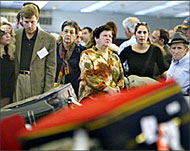Labour strike brings Israeli economy to halt
The Israeli labour federation, the Histadrut, has begun an open-ended nationwide public sector strike that threatens to paralyse the country and deal a further blow to Israel’s troubled economy.

The strike began on Monday despite a last-minute labour court decision which only allowed the Labour Federation to declare a “four-hour protest.”
However, it seems that for the time being union leaders have decided to defy the court order.
As a result, long lines of cars were already forming outside gas stations throughout Israel and hundreds of travellers were temporarily stranded at the Lud Airport, as airports, sea ports and border crossings were closed.
Moreover, electricity and telephone breakdowns will not be repaired during the strike which is expected to cost the Israeli economy as much as $400 million a day, according to Oded Tyrah, head of the Manufacturers’ Association of Israel.
Marathon talks between Histadrut’s head Amir Pertz and Finance Minister Benyamin Netanyahu failed to resolve contentious, with each side blaming the other for the failure.
Israeli Prime Minister Ariel Sharon, now on a three-day visit to Russia, appealed to Pertez to suspend the strike, at least until his return on Tuesday.
However, the fact that the strike has already begun suggests that Peretz is ignoring Sharon’s request.
 |
|
Passengers at Ben-Gurion Int’l |
The Histadrut is protesting against a government privatisation campaign, including plans to overhaul the state welfare system, which Labour Union officials say has left society’s less privileged segments impoverished and more vulnerable.
However, the Israeli government argues that changes in Israel’s state-controlled economy are necessary if the state is to compete in the global marketplace.
Economic woes
Earlier this week, the National Insurance Institute published its annual survey on poverty in Israel, showing that tens of thousands of the elderly and children have joined the ranks of the poor since the beginning of 2003.
According to the survey, more than 1.6 million Israelis or 20% of the population are living below the poverty line.
The rampant poverty is symptomatic of the severe economic crisis facing Israel, the toughest in Israel’s history.
This crisis is rooted in an enduring recession brought on by three years of the Palestinian uprising against the Israeli military occupation and aggravated by a worldwide economic stagnation.
Today, unemployment in the Israel stands at 11%, meaning that over 250,000 workers are jobless.
Huge deficit
In addition, Israel this year registered one of the biggest budget deficits in its history.
According to Finance Ministry figures, the country’s trade deficit in January-September 2003, excluding the Diamonds industry, amounted to $4.9 billion.
The deficit was $3.2 billion with the European Union (EU) and about $1 billion with Asia. Israel had a $700 million surplus with the US in this period.